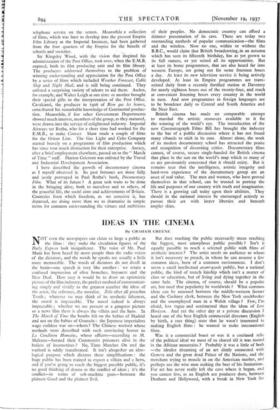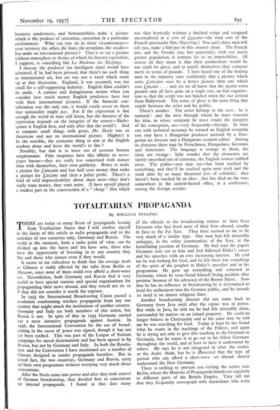IDEAS IN THE CINEMA
By GRAHAM GREENE
NOT even the newspapers can claim so large a public as the films : they make the circulation figures of the Daily Express look insignificant. The voice of Mr. Paul Muni has been heard by more people than the radio voices of the dictators, and the words he speaks are usually a little more memorable. The words of dictators do_ not dwell in the brain—one speech is very like another : we retain a confused impression of olive branches, bayonets and the New Deal. How easy it would be to draw an optimistic picture of the film industry, the perfect method of communicat- ing simply and vividly to the greatest number the ideas of the artist, the reformer, the moralist. Zola after all preaches Truth ; whatever we may think of its aesthetic falseness, the moral is impeccable. The moral indeed is always impeccable ; whether we are present at a gangster picture or a news film there is always the villain and the hero. In The March of Time the bombs fall on the babies of Madrid and not on the babies of Granada : the Japanese imperialists wage ruthless war on—whom? The Chinese warlord whose methods were described with such convincing horror in La Condition Humaine, whose officers—according to M. Malraux—burned their Communist prisoners alive in the boilers of locomotives ? No, Time Marches On and the warlord is oddly transformed. It isn't altogether an ideo- logical purpose which dictates these simplifications : the huge public has been trained to expect a villain and a hero, and if you're going to reach the biggest possible public, it's no good thinking of drama as the conflict of ideas ; it's the conflict—in terms of sub-machine • guns—between the plainest Good and the plainest Evil. But does reaching the public necessarily mean reaching the biggest, most amorphous public possible ? Isn't it equally possible to reach a selected public with films Of aesthetic interest ? The artist needs an audience to whom it isn't necessary to preach, in whom he can assume a few common ideas, born of a common environment. I don't mean a small intellectual avant-garde public, but a national public, the kind of trench kinship which isn't a matter of class or education, but of living and dying together in the same hole. The cinema, of course, should be a popular art, but need that popularity be worldwide ? What common ideas can be assumed between the middle-western farmer and the Cockney clerk, between the New York stockbroker and the unemployed man in a Welsh village ? Few, I'm afraid, less vague and sentimental than the ideas of Lost Horizon. And yet the other day at a private discussion I heard one of the best English commercial directors (English by birth, a rare thing) state that he wasn't interested in making English films : he wanted to make international films.
Was it a commercial boast or was it a confused relic of the political ideal we most of us shared till it was routed in the African mountains ? Probably it was a little of both —the idealist dreaming of an art dimly connected with Geneva and the great dead Palace of the Nations, and the merchant trying to muscle in on the American market, and perhaps too the wise man making the best of his limitations. For art has never really left the cave where it began, and you cannot live, as an English ace producer does, between Denham and Hollywood, with a break in New York for business conferences, and betweenwhiles make a picture which is the product of saturation, saturation in a particular environment. What can you do in those circumstances— your territory the office, the liner, the aeroplane, the studio— but make an international picture ? That is to say a picture without atmosphere or theme, of which the literary equivalent, I suppose, is something like La Madonne des Sleepings.
L daresay the producer (an intelligent man) would have admitted, if he had been pressed, that there's no such thing as international art, but art was not a word which came up at that discussion. England, it was assumed, was too small for a self-supporting industry. English films couldn't be made. A curious and disingenuous notion when you consider how much money English producers have lost with their international pictures. If the financial con- sideration was the only one, it would surely occur to them that nationality might pay. For if the expression is fine enough the world in time will listen, but the fineness of the expression depends on the integrity of the source—Shake- speare is English first, and only after that the world's. And to compare small things with great, Mr. Deeds was an American and not an international picture. Mightn't it be the sensible, the economic thing to aim at the English markets alone and leave the world's to fate ?
Possibly, but that is to leave out of account human megalomania. Film magnates have this affinity to news- paper barons—they are really less concerned with money than with themselves, their own publicity. Better to make a picture for £200,000 and lose half your money than make a picture for £20,000 and clear a paltry profit. There's a kind of wild impracticability about these men—they don't really want money, they want noise. (I have myself played a modest part in the construction of a " cheap " film which was shot hurriedly without a finished script and scrapped uncompleted at a cost of £45,000—the total cost of the French spectacular film, Mayerling.) You can't, these men will tell you, make a film pay in this country alone. The French can, and the Swedes can, but apparently, with our much greater population, it remains for us an impossibility. Of course all they mean is that their productions would be too small for glory, and to justify themselves they compute merit in terms of pounds. I have heard one of the leading men in the industry state confidently that a picture which costs £ Ioo,000 must be a better picture than one which cost £5o,000 . . . and yet we all know that the 50,000 extra pounds may all have gone on a single star, on bad organisa- tion so that the script was not finished when the star arrived from Hollywood. The sense of glory is the main thing that stands between the artist and his public.
There's another. The artist belongs to the cave : he is national : and the men through whom he must transmit his idea, in whose company he must retain the integrity of his conception, are—very frequently—foreign. In what can with technical accuracy be termed an English company you may have a Hungarian producer assisted by a Hun- garian art director and a Hungarian scenario editor. Among its directors there may be Frenchmen, Hungarians, Germans and Americans. The language is strange to them, the ideas are strange : little wonder that the characters are slowly smoothed out of existence, the English corners rubbed away. The public—you may say—has been reached by something, and they'll be reached again next week and the week after by so many thousand feet of celluloid ; they haven't been reached by an idea : that has died on the way, somewhere in the central-heated office, at a conference, among the foreign accents.

















































































































 Previous page
Previous page